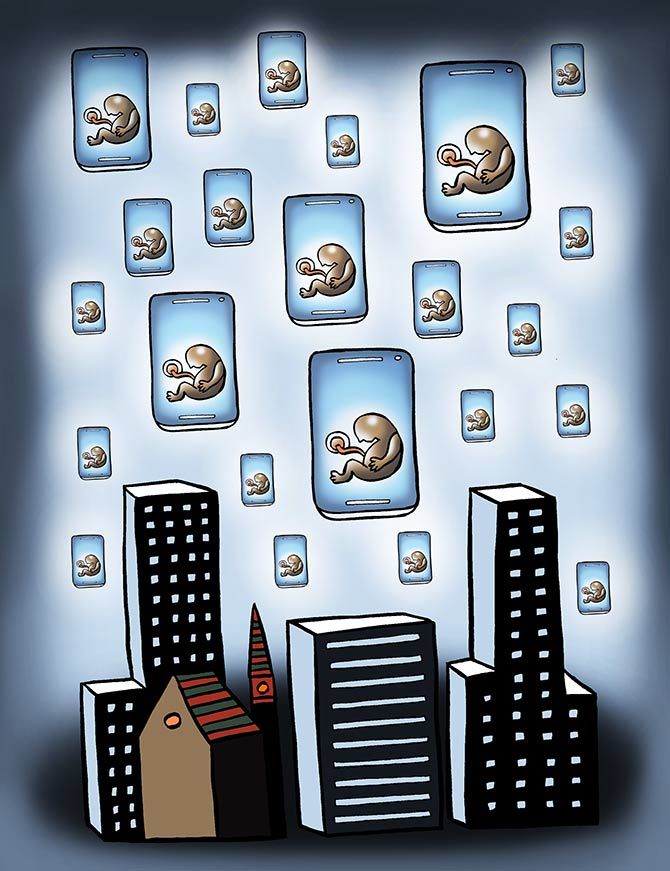Most people have this permanent nervousness about somebody separating them from their smartphones, says Shyamal Majumdar.
Illustration: Uttam Ghosh/Rediff.com

Apple may be celebrating 10 years of the launch of iPhone, but a friend who holds a senior position at a multinational company, hasn't quite got into the mood.
His ire is directed at smartphones in general.
Exasperated at the sight of his teammates frequently staring into their smartphones, even during important meetings, he was forced to find a novel way out.
Before the daily morning meetings start, the giant screen behind him shows various slides. One just says, 'We live in the era of smartphones and stupid people'; another shows the visual of a couple on a rollercoaster ride looking intently at their phones; yet another shows two characters in heaven pointing at a few others and saying, 'Most of the new arrivals are incapable of conversation. They just stare at their hands in despair.'
The friend says the effect hasn't been encouraging: People get fidgety and some of them take frequent breaks.
He wonders what will happen once those billions of embedded cellular modules keep chattering through wearable phones -- in wristwatches, even spectacle frames.
He isn't alone. Despite the obvious benefits of smartphones -- after all, they have brought an unprecedented level of convenience to our lives -- they have taken a heavy toll on the work-life balance.
In fact, the use of smartphones to stay connected to work 24/7 is so common that it's now considered the new normal.
So the phones nestle in pockets and sit by bedside tables.
Most busy executives check their smartphones every five to 10 seconds and many feel guilty for depriving their team members of all the interesting things they have to say or text or tweet, without realising that they may have become victims of what clinical psychologists call 'nomophobia' -- a permanent nervousness about somebody separating them from their phones.
A senior executive says he looks forward to his long drive from office to home as he can concentrate on working on the route. Even while on holidays, he reckons a few 'firefighting' business calls are unavoidable.
There are many like him. They get anxious if there’s no Wi-fi in the hotel or mobile phone signal up the mountain.
They fret if their phones get low on power, and secretly worry that things will go wrong at work if they are not there.
These are the typical signs of 'always on' stress induced by smartphone addiction.
Many of us are checking texts and emails first thing in the morning and last thing at night.
A study by the Centre for Creative Leadership found that professionals, managers and executives who carry smartphones for work, report interacting with work 13.5 hours every workday (72 hours a week, including weekend work).
The study also found that, on average, they have only about three hours on workdays for 'discretionary' activities such as being with their family, exercising, showering and all those chores at home that someone has to do.
'Startlingly, they don't blame technology for this dilemma that has them scrambling to manage their personal lives.'
That's why many people are fatigued and angry about being 'always on' and never done, the line between their personal and professional lives blurred if not eliminated.
The most dangerous thing is to fall into a mode of permanent activity and continuously consult one's smartphone to see whether any new mails have come in.
Other research on occupational stress has revealed how the smartphone sitting on our nightstand impairs our sleep and makes it impossible to detach from work owing to its invasive, 'always on' nature.
Many people, who use their smartphones for work-related communications, tend to have a difficult time psychologically detaching from their jobs.
This, in turn, makes them vulnerable to work-related exhaustion, leading to more burned-out employees, who are exhausted and cynical.
Thankfully, smart employers are realising that they won't retain their best workers if they treat them like a 24-hour concierge service.
The final call to take advantage of the incredible benefits that smartphones bring lies with you, by being disciplined about its usage.
So, if you're getting ready to go on a holiday, set up those 'out of office' email alerts and switch off your phone when you go to bed.
After all, you are rarely the only who can resolve issues.
They can do without a 'smart' call from you.











